Her Majesty's Loyal Pleasuredrome
The Funeral of Her Majesty Queen Elizabeth II as seen from the vantage of a Gay Sauna in London
The Old King’s Head, shortly after we received the fateful news.
Grief bewitched the nation, more or less. Or at least, by the time they announced the death of Her Majesty, Queen Elizabeth II, the pubs were full, but then grief can affect us all in the most unexpected of ways. Pubs fill up when something is happening, but when the British don’t know what to do about it. I remember shortly after a massive terrorist attack on London’s transport system, a man told me he had wandered, as if on a dazed autopilot, into the pub. An hour or so later, he said, a policeman had burst in and rather than closing the premises had simply ordered the landlord to keep serving beer to the sheltering citizens. By order. These are the kind of anecdotes that the British love to tell about themselves. Absurd but humble, flattering themselves with their own idiosyncrasies. The week that followed the death of the Queen would be full of them; a pile of marmalade sandwiches outside the palace; the Queen’s Beekeeper informing the Queen’s bees of her passing; and of course, a queue.
It’s been seventy years since the last monarch died. People have had to learn again how to enter such a social state of mourning. There are few hats left to remove. There is no longer any personal correspondence in need of black-bordered envelopes. Instead, supermarkets turned down the beeps on the self-checkout machines. LCD billboards across the capital switched to displaying the Royal cipher or Her Majesty’s portrait in sombre monochromes. Even Pleasuredrome, a gay sauna hidden in the catacombs beneath London’s 19th century Waterloo train station, announced it would turn off its usual thumping house music and instead screen the funeral of the late monarch, with champagne provided by the proprietors to toast the new one, Charles III.
It was a curiously Dickensian offer, to my mind: in the darkness of subterranean Lambeth, amongst the unspeakable sinning, a couple of small businessmen do their best to uphold some semblance of propriety towards Her Majesty, even if business, being business, must carry on. I can see why Pleasuredrome, a place where gay and bi men go to relax and cruise for sex, seemed so much funnier a place for people to pay respects than, say, a garden centre, charity shop or football club, but there was something in this mix of Dickensian nostalgia and obsequiousness, of darkness, thrill and mourning, of sex, ritual, and stupidity that just seemed to me so, well - so regal. I knew I had to be there, beneath the railway arches, amongst the dry heat and damp men, the shifting eyes and many low voices, the vaulted Victorian brickwork and the discarded lube packets, to watch our gracious Queen laid to rest. After all, We were Her people too.


I came to Pleasuredrome because I saw a tweet about it. As I said, I get it, of course, the absurdity of the whole situation, the public mourning. It is funny that they’re showing the Queen’s funeral here. I went up to Hyde Park first, with friends, to see the crowds, funneled by the enormous anti-terrorism hoardings, 15ft high steel walls that encircled the heart of the city. But I had to come here, after seeing the tweet, to see how a state of mourning fits with a state of desire. Part of me feels weird that a gay sauna is the punchline, but I’m trying not to be too oversensitive these days. I’m just getting older, and less desirable (at least, in theory), and aware that young gay men in search of casual sex are powerful and enigmatic, but as we age, we become more pitiable, both abject and threatening, especially when the sex is on premises or in cruising grounds. But inside the sauna, our presence isn’t a punchline, but a potential. In the locker room I undress, tie a towel around my waist, and slip into the venue. In the bar, men chat with each other. The atmosphere is light, and only slightly cruisey, out of respect no doubt, as the funeral is being replayed on the widescreen TV. I am disappointed; the ignored TV aside, it could be any night. But then, what did I expect? In one of the small saunas I chat idly with a handsome young Canadian man. You should count yourself lucky, he tells me. We could have President Trump. Well, yes, I reply, but we might just as easily have had King Andrew. Another man adjusts his erection beneath his towel. I’m killing the vibe. This is no place for politics, and so I leave.
Her Majesty remembered by Waterloo Station. Yards from this site, men interact lasciviously with one another.
Only occasional light breaks into the steamroom, a nine square metre box entirely absent of furniture or lighting. It’s lined with tiles, and a few glass bricks cast just enough light to throw figures into a murky, ill-defined relief, but when a fresh blast of hot, slightly foetid steam fills the space, the light fails to penetrate. We recede into mist. Between steam and darkness, I can’t see a thing, just the vague sensation of the thick plastic blinds being pushed open when another man enters the space. It is like waking from under anaesthetic. As he walks past the glass bricks, I can see little more than a white towel wrapped around his waist. With your sense limited, the world seems to encroach upon you; your consciousness shrinks back and you become hyper aware of each movement, of sensation. The darkness has me trapped. I take in a deep breath which pricks against my respiratory system. I can sense him without seeing him. “Stupid, sexy lizardbrain,” I think. The promise of such intensities of perception can surely never be delivered. Yes, he is stood beside me now, and as the fog recedes and our eyes adjust we can make out the blurred delineations of each other's bodies. He’s slim, dark, his energy strong. A hand approaches and, with the gentlest touch, he runs the back of two fingers along my chest to my nipple. I place out my palm and find his stomach. Another dense cloud of hot steam obscures us. As our lips touch and my tongue finds his, my eyes close, my ears sharpen, my heart races. I run my hand through his thick black hair. Drifting through the chiller blinds, the State Trumpeters of the Household Cavalry play the Last Post at Westminster Abbey.
A new King is proclaimed to his subjects
What does it mean to love the Queen? What does it mean for the Queen to love us? How can you feel so deeply, so intensely, about someone you barely know? These are the questions I was asking myself while watching the vox pops that filled the days between death and interment, wiping the baked beans from my plate with a piece of margarine-laden bread at the cafe near where I was staying. Each morning I’d go there, swap the fried slice for a hash brown on the special, and think about England. Well, what do you expect people to say at a moment like this? England remains a monoculture in so many ways — the culture of its media, regardless of political bent, is still drawn from a small public school and Oxbridge demographic — and the long days of rolling coverage of not-much seemed to prove it. There were moments of almost unfathomable importance, the rare exposure of the workings of the British constitution, the actual workings of power long claimed as impotent, purely ceremonial. Then there were long periods of boredom. Despite the fact that news, that history, did not stop, that prices continued to rise, cops continued to shoot people, wars continued to rage, the monoculture felt obliged to fill the air with our thoughts and feelings, which suddenly seemed to matter. So what did I expect people to say at a moment like this? We loved her, she loved us, she worked, she suffered, she felt. Put a camera in front of most of us and we would say the same thing, the appropriate thing. Now was not the time to say “this is not how we should allow ourselves to be ruled”: a Queen had died. Now was not the time to say “sexual predators should face justice in court”: a Mother had died. Now was not the time to say that “we should not already know who will rule our unborn grandchildren”: a grandmother had died.
That’s the point, of course. The point of the whole constitution, to embody the might of the state within a family, to make it small, human in scale. Once upon a time the coterie that surrounded the British royal family was as swollen as any European royal court, with liggers and arse-lickers filling ballrooms and banquets, their closeness to power an investment that kept them loyal. It was the Victorians who shrank their court, creating the model of a bourgeois family which their subjects could, and should, emulate, supposedly restrained and moral. It was the perfect antidote to the growing urban proletariat’s predilection for drink, song and sex, something that had begun to concern the British elites over the Georgian period. By foregrounding not just the person of the monarch, but their familial ties, their being “just like us”, the Royal Family produced a sense of investment in their own intimate lives, a parasocial relationship that has only increased as technology and a changing media has brought them closer to us. As a Victorian lady visiting a performance of Shakespeare’s Anthony and Cleopatra at the Lyceum was said to have remarked, “Dear! dear! what a contrast to the home life of our own dear Queen.” I stand at the bar and watch the TV cameras trained on Prince George, a nine year old boy, with all the expectations of the future state just waiting to engulf him as millions study his face, fantasise about his wedding, imagine his children. Something perverse and grotesque is going on here, but it isn’t in these railway arches.
The day before the funeral I had attended a Quaker meeting for worship. A young man who lives on the streets stood up to offer his ministry. I’m unexpectedly touched by his story, and when he remarks, as his closing thought, that “Prince Charles must be gutted, because it’s his mum, innit?” I well up a little. I’ve heard that familial relation invoked so much over the past ten days, but always to shut down discussion, always some half-hearted justification. Suddenly to hear it as a sincere, basic human response, and from someone otherwise on the bottom rung of the society the King now oversees, touched me with its simple kindness. Strange that, despite so much discussion of emotion, grief, loss, love, this is the first time I have felt anything about it, anything that isn’t frustration or exhaustion. I guess I have had a hard time switching registers between thinking of the constitutional role, and the family.
Away from the bar, I sit in the little cinema. I thought they weren’t playing videos, but I guess people need respite from their grief, in much the same way that Channel 5 was the only British TV channel to opt against screening the funeral and showed The Emoji Movie instead. On screen is a pornographic satire about two competing brothel keepers in the 18th century. I recognise the actresses immediately: Sophie Anderson and Rebecca More shot to fame as gay icons a few years ago under the shared name “the Cock Destroyers”, promoting their own (straight) porn as big-titted, big-lipped larger-than-life women whose lust for sex was so insatiable that straight men were little more than disposable penises. The porno was fittingly titled “A Tale of Two Cock Destroyers”, a saga in the mode of a sprawling Victorian novel, in which each madame attempted to destroy the other’s business using a series of hot bottoms to fuck the other’s clients or something I guess, I don’t know I wasn’t really following the plot. I recognised the writer Rose Dommu, and Ty Mitchell too, a porn actor and writer whose First Openly Gay Book Club I read (for the articles). He’s hot. I was turned on. “It’s not really Dickensian, though,” I thought, watching the high camp Georgian wigs and buckled shoes, wondering what other more Hogarthian “Cock Destroyer” pun I could find, thinking about the sort of arch-filth the Georgians were capable of, before the moralistic backlash of the Victorians — led by the tight-arsed, slimmed-down Royal Family itself — destroyed Britain’s long and wonderful heritage of earthy, lusty, life-loving, cock, cunt and arse-embracing sexual culture. What did they replace it with?
Well, what was showing in the bar, I guess. Like “A Tale of Two Cock Destroyers”, most of the pomp and ritual, the ceremony that surrounds the Royal Family, its parades, its orders of chivalry, are not just anachronisms today but were anachronisms when they were first introduced. 19th century confections made to look like mediaeval inheritances, to give an appearance of a timeless Albion. Combining this fabricated ceremonial culture (a favourite of incipient nationalisms) with the monarchy as the family of the Nation, whose matriarch addresses her subjects on the most sentimental of family holidays, Christmas Day, is a heady mix. Nostalgia is baked into a sentimental nationalism in which continuity, rather than citizenship, is the most highly-prized asset. No wonder people become so emotional on occasions of collectivity like this — all this stuff must mean something, surely? Yet the theatre of the British state is largely a Victorian invention — prior to her reign, the British were noted for being particularly bad at state rituals — and came about with the shrinking of the court. Anarchronism, high camp theatricality, hammy scripts and outrageous outfits: suddenly, there doesn’t seem to be such a distinction between the constitutional monarchy and the Cock Destroyers. It’s only a matter of how much you want to believe.
I see a another man watching me as I watch the film. He’s checking me out. He stands closer to me, against the wall, his arm awkwardly outstretched to reveal his open palm. I reach for his hand. He holds me. He squeezes it, tenderly, a few times. I feel touched by that gesture. So strange, holding hands in porn cinema.
Backside & front view of the ladies fancy-man, Paddy Carey O'Killus Esq &c &c - Erected in Hide Park, in honor of the "Waterloo man" & his Soger men, by Cruikshank
I can hear laughing. This is not a place of honour. I enter the cubicle and he follows. Against all that ceremony, this warren of poofs. We throw our towels over the door — the lock is bust, smashed in, what story there? She lived a life of exemplary duty. His dick is perfect and short, rock hard, turned upwards. No flags laid down here, to fuck upon. Crouched in a squat I’m struck by the preponderance of thick, muscular thighs, his hands on his and mine on mine. How can a person be a state? What flesh? Which body? Could our thighs become Senates, our chests Parliaments? I would vote for us in this moment. He doesn’t speak much English, a disqualification for government, but not for a prince. They commend her soul to god. He tells me I’m fucking sexy. We are both blessed. The cabin is no wider than a toilet cubicle. As I blow him I can tell there are two faces looking through the bars of the dick-height window between our cabin and theirs. I like an audience. The camera cuts to the ceiling, looking down upon the assembled. An honour guard of soldiers shuffle to either side of the body. Someone tries to come in and he slams the door in his face. Once, twice, and he shouts “NO!” Our towels are there: why do some people not respect our traditions, our protocols? He is protective of me, squatting on my haunches. He’s so sensitive. I feel protected and it makes me want to make him happy. Outside a hundred cadets wait, bound to the gun carriage, their muscles ready to haul the state, crown, sceptre, orb and all to the royal vault. I’m pinned against the wall of the cubicle and his hands push my triceps to the wall. His hands grip them, I tense them, he runs his fingers along my shoulders and cups my face gently to kiss me. Presidents and Kings and Cardinals and Torturers are gathered. I wasn’t expecting such a tender fuck. Outside the artillery fire blanks across Hyde Park. The statue of Achilles stands there, London’s first nude statue since the Romans, funded by the women of Britain. I realise I never got his name. It is cast from enemy cannon seized by the Duke of Wellington in the Peninsular Wars. His exposed buttocks were scandalous. He is tall and muscular and beautiful. I am overtaken in the moment by the care with which he desires. We are both thrilled by each other. As we finish we collapse against the wall in each other’s arms. Downstairs the vox pops continue. We kiss again and leave in different directions. As I shower I ask myself, how can you feel so deeply, so intensely, about someone you barely even know?
‘utopian drivel’ is written by Huw Lemmey. To be honest, it’s mostly about gay stuff. Paid subscribers get access to the entire archive of 90+ essays, including posts such as this piece on Gore Vidal and “fag affect”, this essay on disgust and David Hockney, this piece on kink and character from Patricia Highsmith to ‘Sex and the City’, and this essay on gender, perversion and the war in Ukraine. Free subscribers get occasional essays, like this one about gay spies. Please do share this if you enjoyed it.

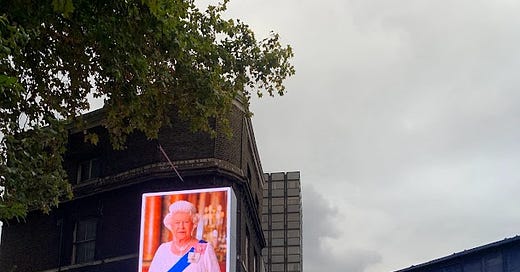

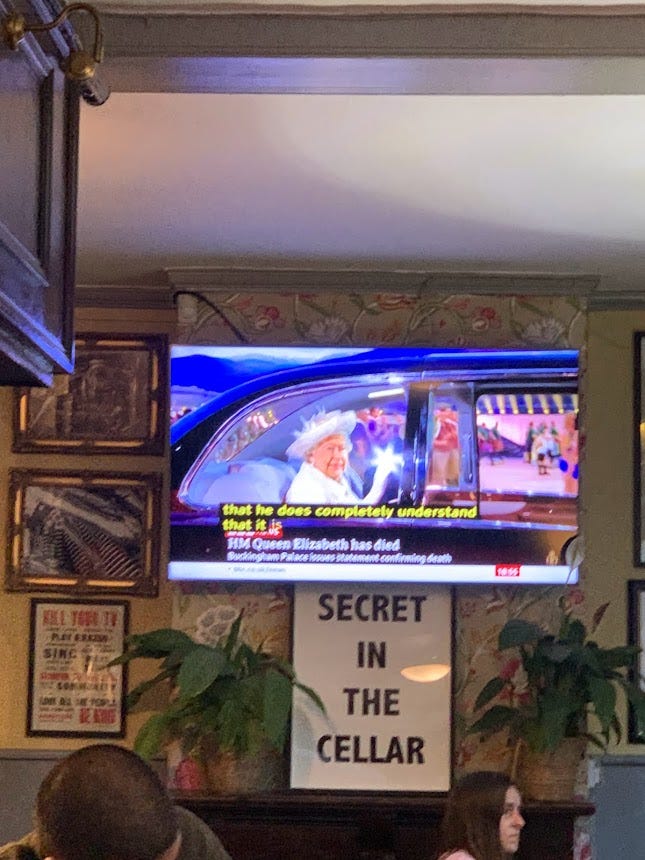

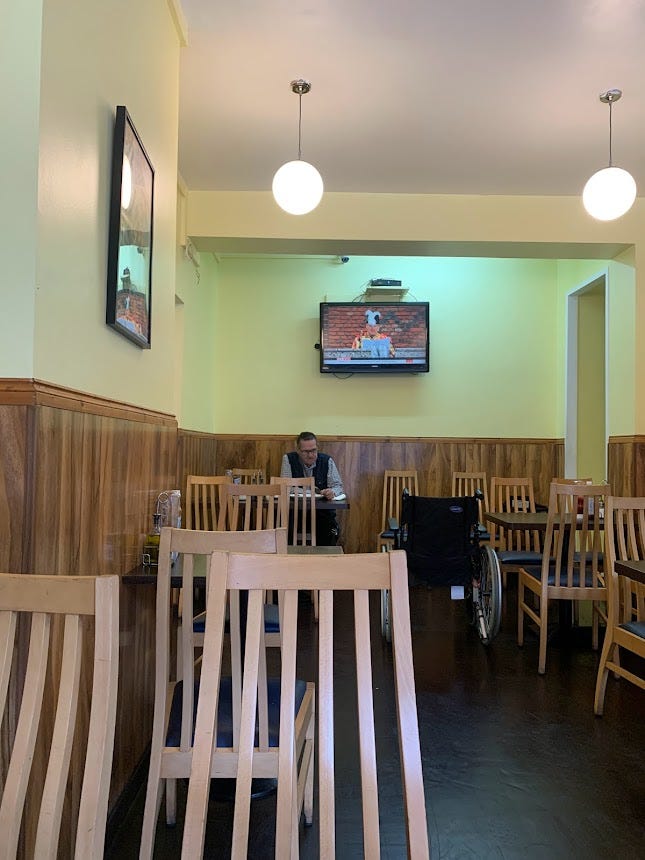
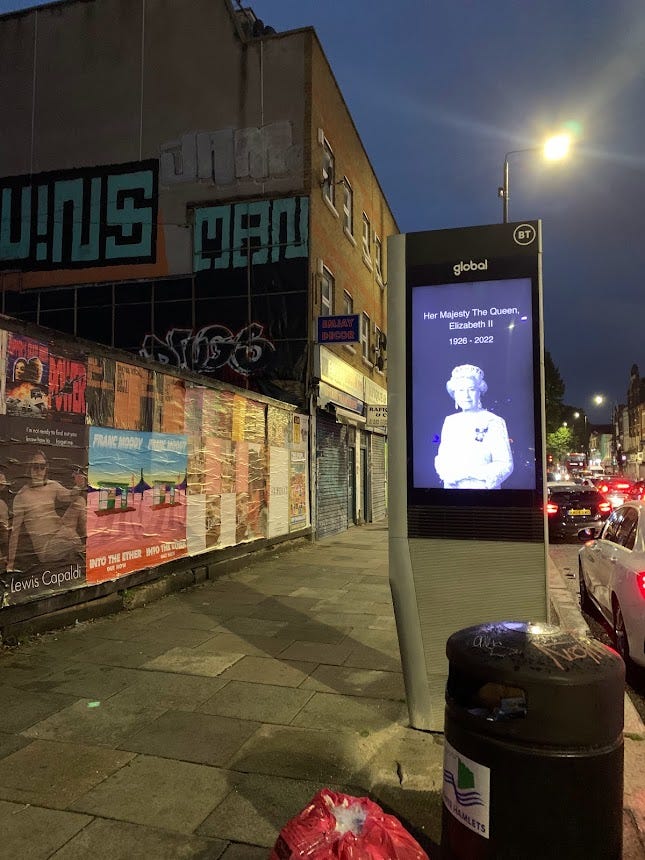
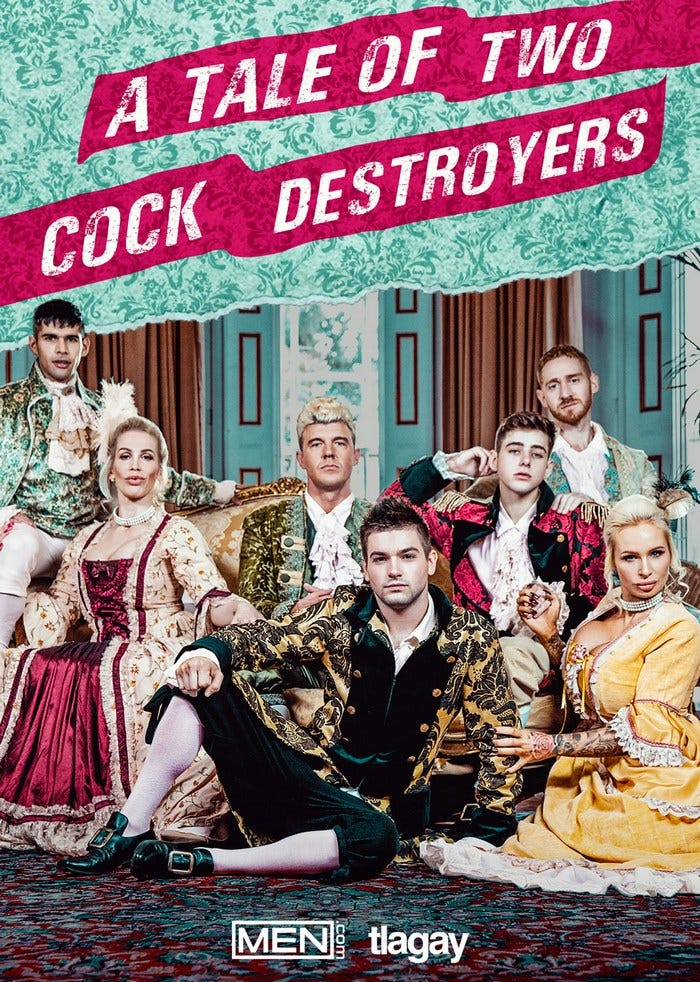
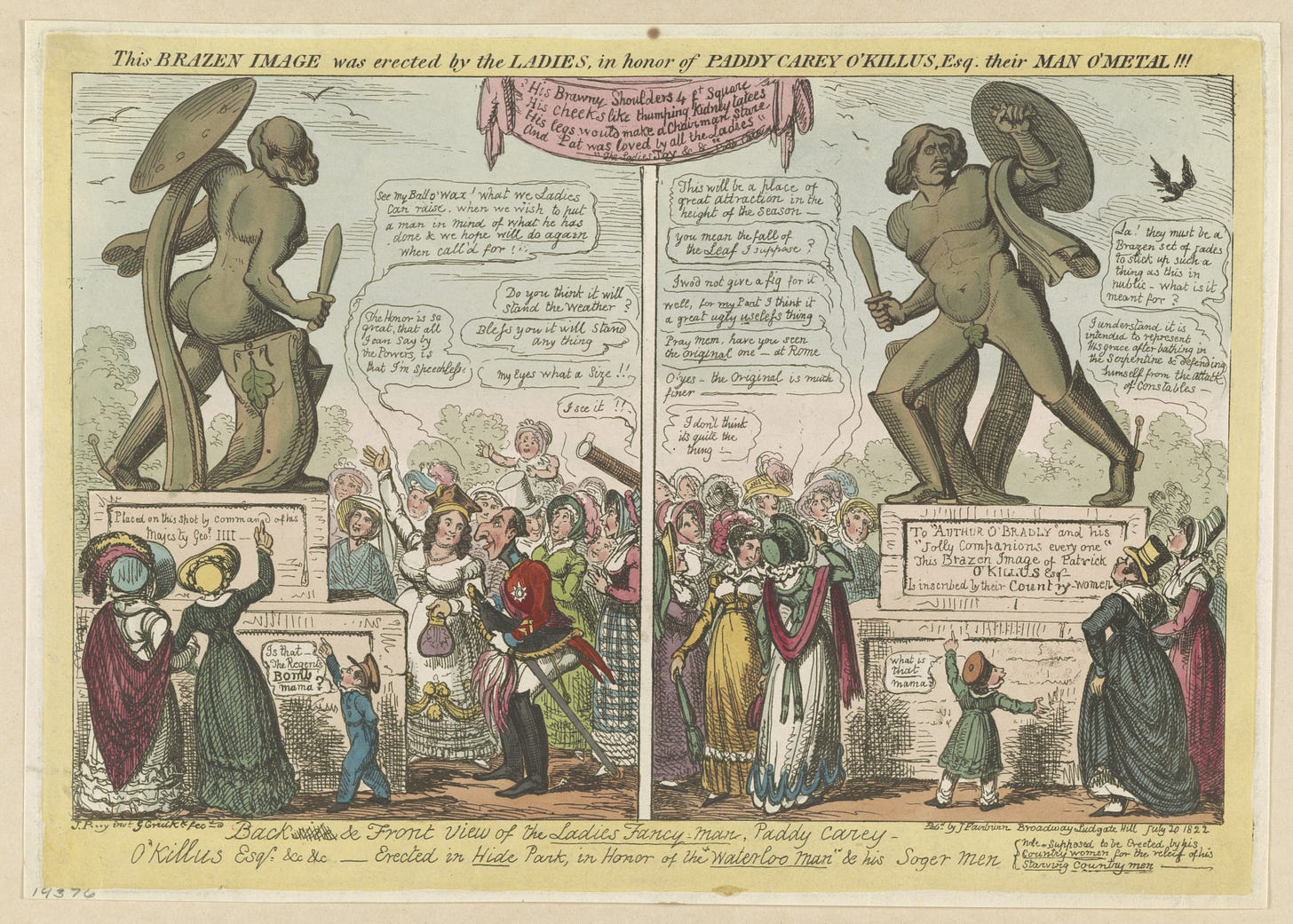
This is another great piece Huw. I, like every other terminally online gay man, saw the pleasuredome tweey and all the associated posting about it.
I’m just glad to actually read a first hand account of what it was like to be there. I still think there is a decent book to be written about the various food offerings in gay saunas across Europe.
The part about your experience at a recent MfW especially stuck a cord as I think it was at my own MfW that I changed my view about the Queen’s death. I was challenged about my Ministry in only the way that other Quakers can.
I suppose that is what I appreciate about Quakerism so much - the breadth of views held by Friends. That there is no pressure to reach a consensus on what the “correct” thing to do or say is.
Huw you are a true 'MASTER' in your descriptive writing about 'OUR' experience(s). Thank you so very much!!!!!